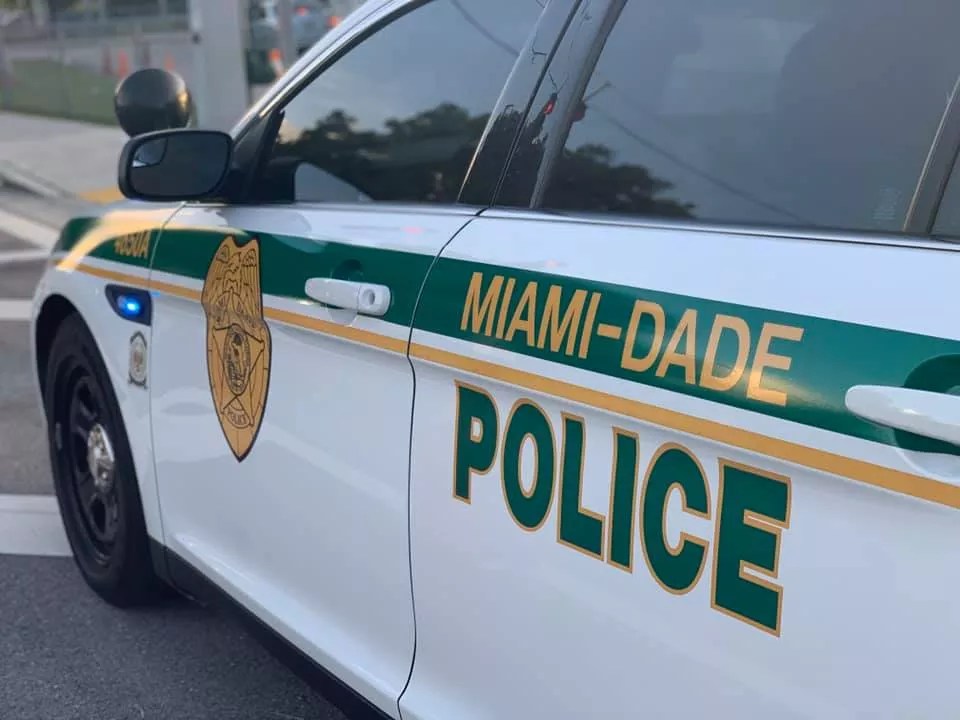
Photo by Miami-Dade Police Department

Audio By Carbonatix
More than a decade after it was defunded because of budget constraints, Miami-Dade County once again will have a civilian review panel that can investigate complaints of excessive force and other types of misconduct by county police officers.
Commissioners today voted 8-5 to reinstate the Independent Review Panel. County Mayor Carlos Giménez, who twice in the past two years has vetoed the panel despite commission approval, said he would not use his veto power a third time. Commissioners Audrey Edmonson, Sally Heyman, Eileen Higgins, Barbara Jordan, Daniella Levine Cava, Jean Monestime, Dennis Moss, and Xavier Suarez voted yes. Commissioners Esteban Bovo, Jose “Pepe” Diaz, Joe Martinez, Rebeca Sosa, and Javier Souto voted no.
The board will be renamed the Independent Civilian Panel. In addition to investigating citizen complaints, the 13-member panel will have the authority to inspect all closed Miami-Dade Police Department (MDPD) internal-affairs files and make recommendations about police department policies, procedures, training, and recruitment.
Today’s vote is the result of years of advocacy from social-justice groups and Commissioner Barbara Jordan, the main legislative sponsor of measures to reinstate civilian oversight in the county.
“The community will finally get an Independent Civilian Panel to provide increased transparency to reported allegations of police misconduct,” Jordan said in a statement to New Times.
Commissioner Daniella Levine Cava, a mayoral candidate who has also advocated for civilian oversight of police, called the vote a “landmark decision” for the community that “ushers Miami-Dade policing into the 21st century.”
“The panel is a critical first step to creating trust, oversight, and transparency between law enforcement and the community,” Levine Cava said in a statement.
Miami-Dade implemented a police oversight board in 1980 following riots over the acquittal of four county police officers in the fatal beating of Arthur McDuffie. The board lost funding in 2009 because of the economic recession. Jordan most recently pushed for the panel’s reinstatement because of widespread calls for stronger police accountability measures locally and nationally over the police killings of George Floyd and Breonna Taylor.
Twice since 2018, Giménez has vetoed legislation approved by the commission to bring back the civilian-led police oversight panel. The mayor argued there was no need for such a panel and previously said “there is no greater accountability measure” than his own expectations for county employees, including police.
Today, the mayor said he still thinks formal civilian oversight is unnecessary. He raved about the “false narrative” that there is no civilian oversight of the Miami-Dade Police Department and called such a notion a “complete falsehood” and “complete baloney.”
“Every one of us in here are civilians,” Giménez said. “And we are the duly elected representatives of the people. We have direct responsibility over the police department….So this whole notion that there is no civilian oversight of the police department is a complete false narrative. We have oversight. We can tell them what to do, and as a matter of fact, we do.”
Jordan responded that members of the county commission are not civilians but elected officials.
Nevertheless, Giménez said he would keep his promise and not veto the panel again.
In previous commission meetings, Giménez said he took issue with the panel having subpoena power. Earlier this summer, the ordinance to reinstate the panel was written in a way that would have allowed members, by majority vote, to issue subpoenas for witnesses, documents, and evidence as long as the inquiry didn’t interfere with active investigations by other agencies.
The mayor said he believed subpoenas could be used for politically nefarious purposes and opposed the possibility that county employees and elected officials could be called to testify in an investigation against a police officer. Giménez said he would allow the panel to move forward if the ordinance specified that county employees and officials can’t be subpoenaed. The version of the panel approved today excludes county employees from being subpoenaed.
Jeanne Baker of the Greater Miami chapter of ACLU Florida says today’s vote is a major milestone, but it’s only one step on the road to actually implementing civilian oversight.
Baker, an advocate of civilian oversight, says she hopes the commission will sufficiently fund the panel and that politics won’t get in the way of its ability to function. She points out that the county will soon have a new mayor. Commissioners Bovo and Levine Cava are the two mayoral candidates heading toward a runoff in November.
“Bovo has been a persistent, consistent opponent for years now, and there’s no reason to think he will change in any way if he were to be elected mayor,” Baker says. “So I think civilian oversight of police will be in deep trouble if he becomes mayor, whereas Daniella has been a champion of police oversight.”
Baker says the panel will provide a dispute resolution process that she hopes will strengthen communication between citizens and police.
“This could be a pathway to improving relations between the police and the community,” Baker says.
Rodney Jacobs, assistant director for the City of Miami’s own civilian oversight board, the Civilian Investigative Panel, says he applauds the county panel’s approval.
“This tool is a united effort from all corners of our county,” he says. “We have pushed Miami forward in ways many thought would be impossible. Everyone, including police, can feel proud about this vote by the [board of county commissioners]. Let us rest in this victory, knowing the hard work has just begun.”